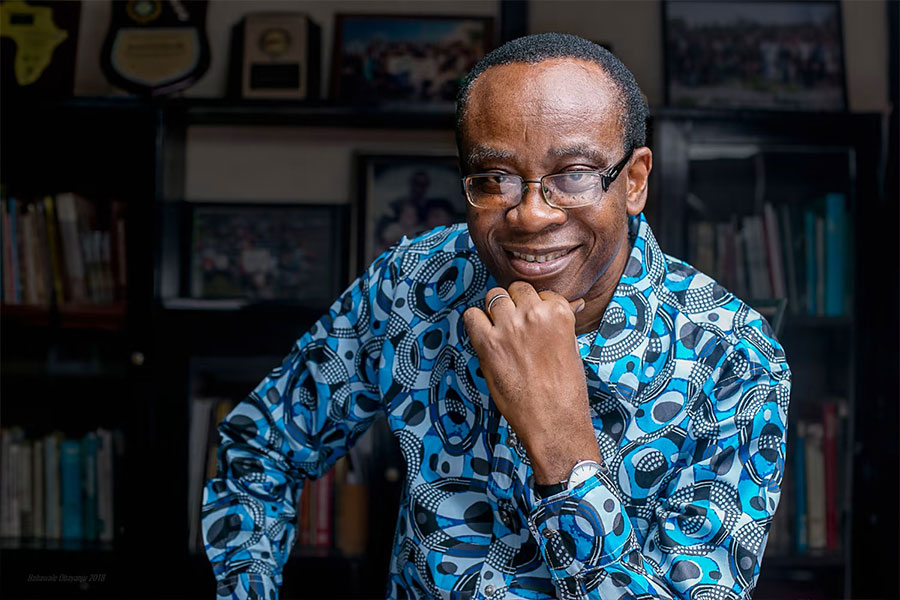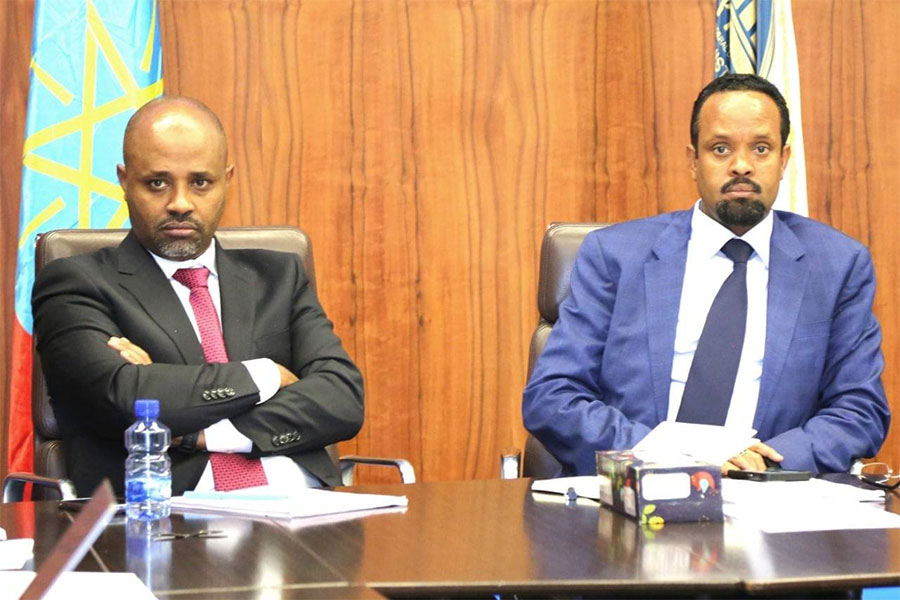
Dec 10 , 2022
By Vera Songwe , Nicholas Stern and Amar Bhattacharya
One more international summit on climate change has come to pass. But the question of who will foot the bill in trillions of dollars responding to the crises remains unanswered. The rich world must not only do much more to reduce its own emissions, but it must also generate the financing needed to help others and to protect the world's poorer countries from a problem they did not create, write Vera Songwe, under-secretary-general of the United Nations; Nicholas Stern, a former chief economist of the World Bank; and Amar Bhattacharya, a professor of economics. This article is provided by Project Syndicate.
The dust settled after the United Nations Climate Change Conference (COP27) in Egypt, but many unanswered questions remain about financing emissions reductions and adaptation. The world will not avoid dangerous levels of climate change without a significant increase in investment in developing countries. If these countries lock in dependency on fossil fuels and dirty technologies, they will be the largest source of emissions growth in the coming decades.
Fortunately, such investment cannot only reduce emissions and build resilience; it also can drive a new form of growth and development that is much more attractive than the dirty and destructive paths of the past. Helping these countries accelerate the transition to sustainable, inclusive, and resilient economies are, therefore, in developed countries' own interest.
We were commissioned by the Egyptian COP27 and the British COP26 presidencies to conduct an independent analysis of the financing that developing countries (other than China) will need by 2030 to realize the goals outlined in the Paris climate agreement. Our report, published during the first week of COP27, concluded that these countries' annual investment in climate action needs to increase immediately, from about half a trillion dollars in 2019 to one trillion dollars by 2025, and 2.4 trillion dollars by 2030.
That investment will not only deliver on the Paris agreement but also drive this new form of growth and advance progress toward achieving the UN Sustainable Development Goals.
We identified three investment priorities.
First, financing should go toward accelerating the energy transformation, particularly the deployment of renewables, as this is essential to keeping the Paris agreement's targets within reach.
Second, we need increased investments in resilience to protect lives and livelihoods – particularly among the world's poorest communities – against the increasingly devastating effects of climate change, as well as effective, properly-funded mechanisms for addressing loss and damage (defined as costs that cannot be prevented by mitigation or adaptation). And, third, we urgently need to enhance biodiversity and conserve the ecosystems on which we all depend.
Investments in nature represent vital contributions to both resilience-building and emissions reductions.
About half the financing for these investments could be met from domestic public and private sources in developing countries. An additional one trillion dollars or so a year could come from outside sources. While public sources of finance, internal and external, will be essential, the largest share can come from the private sector, which will invest in securing attractive returns from the growing market for zero-emissions and climate-resilient goods and services, provided that the risks can be reduced and managed.
A stronger partnership between the private and public sectors can unlock new investment opportunities, manage risk, reduce the cost of capital, and mobilize the necessary financing at a much larger scale. But this funding must come from the right sources, such as philanthropic foundations, the International Monetary Fund's special drawing rights (the IMF's reserve asset), or carbon credit sale.
Moreover, grants and low-interest loans by developed-country governments should double in 2025 from 30 billion dollars in 2019. This funding will represent only a small share of the overall sums required, and it should be carefully targeted at priorities that will not attract significant investments from the private sector. To put this in perspective, 60 billion dollars would represent only about 0.1pc of developed countries' projected economic output in 2030, or about 0.7pc of the nine trillion dollars that rich countries allocated over the past two years to cope with COVID-19.
Finally, the World Bank and other multilateral development banks have a critical role in achieving the Paris targets. Their annual investments in climate action will need to triple to 180 billion dollars by 2025, from about 60 billion dollars today, to realize co-financing with the private sector on the necessary scale, combined with support for public infrastructure.
The decision at COP27 to create new loss-and-damage funding arrangements recognizes that additional investment by developed-country governments is needed to help developing countries limit the harm from more frequent and severe extreme weather events, rising sea levels, desertification, and other climate-driven problems. All countries are already suffering loss and damage from climate change, but the social and economic consequences can be far more devastating for developing countries, which face not only repair and reconstruction costs but also severe reductions in economic output, employment, and living standards.
Loss and damage also increase the risk that people in vulnerable and highly exposed parts of developing countries will be forced to migrate, further jeopardizing social and political stability. If poor countries can become more resilient to climate impacts and recover from them more quickly and effectively, they will be able to invest more in low-carbon development, and they will pose less of a risk to regional and global security and stability.
Again, while developing countries have long argued, with justification, that rich countries should provide separate financing to developing countries as compensation for the loss and damage related to past emissions, doing so is also in rich countries' interest.
The 2020s are the crucial decade in the fight against climate change. Further delay would be profoundly dangerous. But all countries will need to advance the transition to carbon neutrality. The rich world must not only do much more to reduce its own emissions. It must also generate the financing needed to help others and to protect the world's poorer countries from a problem they did not create.
PUBLISHED ON
Dec 10,2022 [ VOL
23 , NO
1180]

Agenda | Jul 13,2024

Editorial | Nov 26,2022

Fortune News | Jul 18,2020

Exclusive Interviews | Jan 07,2023

Radar | Dec 21,2019

My Opinion | Dec 25,2021

Radar | Jul 06,2019

Fortune News | Mar 21,2020

Fortune News | May 14,2022

Fortune News | Apr 19,2025

My Opinion | 131451 Views | Aug 14,2021

My Opinion | 127803 Views | Aug 21,2021

My Opinion | 125784 Views | Sep 10,2021

My Opinion | 123419 Views | Aug 07,2021

Dec 22 , 2024 . By TIZITA SHEWAFERAW
Charged with transforming colossal state-owned enterprises into modern and competitiv...

Aug 18 , 2024 . By AKSAH ITALO
Although predictable Yonas Zerihun's job in the ride-hailing service is not immune to...

Jul 28 , 2024 . By TIZITA SHEWAFERAW
Unhabitual, perhaps too many, Samuel Gebreyohannes, 38, used to occasionally enjoy a couple of beers at breakfast. However, he recently swit...

Jul 13 , 2024 . By AKSAH ITALO
Investors who rely on tractors, trucks, and field vehicles for commuting, transporting commodities, and f...

Jun 28 , 2025
Meseret Damtie, the assertive auditor general, has never been shy about naming names...

Jun 21 , 2025
A well-worn adage says, “Budget is not destiny, but it is direction.” Examining t...

Jun 14 , 2025
Yet again, the Horn of Africa is bracing for trouble. A region already frayed by wars...

Jun 7 , 2025
Few promises shine brighter in Addis Abeba than the pledge of a roof for every family...

Jun 29 , 2025
Addis Abeba's first rains have coincided with a sweeping rise in private school tuition, prompting the city's education...

Jun 29 , 2025 . By BEZAWIT HULUAGER
Central Bank Governor Mamo Mihretu claimed a bold reconfiguration of monetary policy...

Jun 29 , 2025 . By BEZAWIT HULUAGER
The federal government is betting on a sweeping overhaul of the driver licensing regi...

Jun 29 , 2025 . By NAHOM AYELE
Gadaa Bank has listed 1.2 million shares on the Ethiopian Securities Exchange (ESX),...